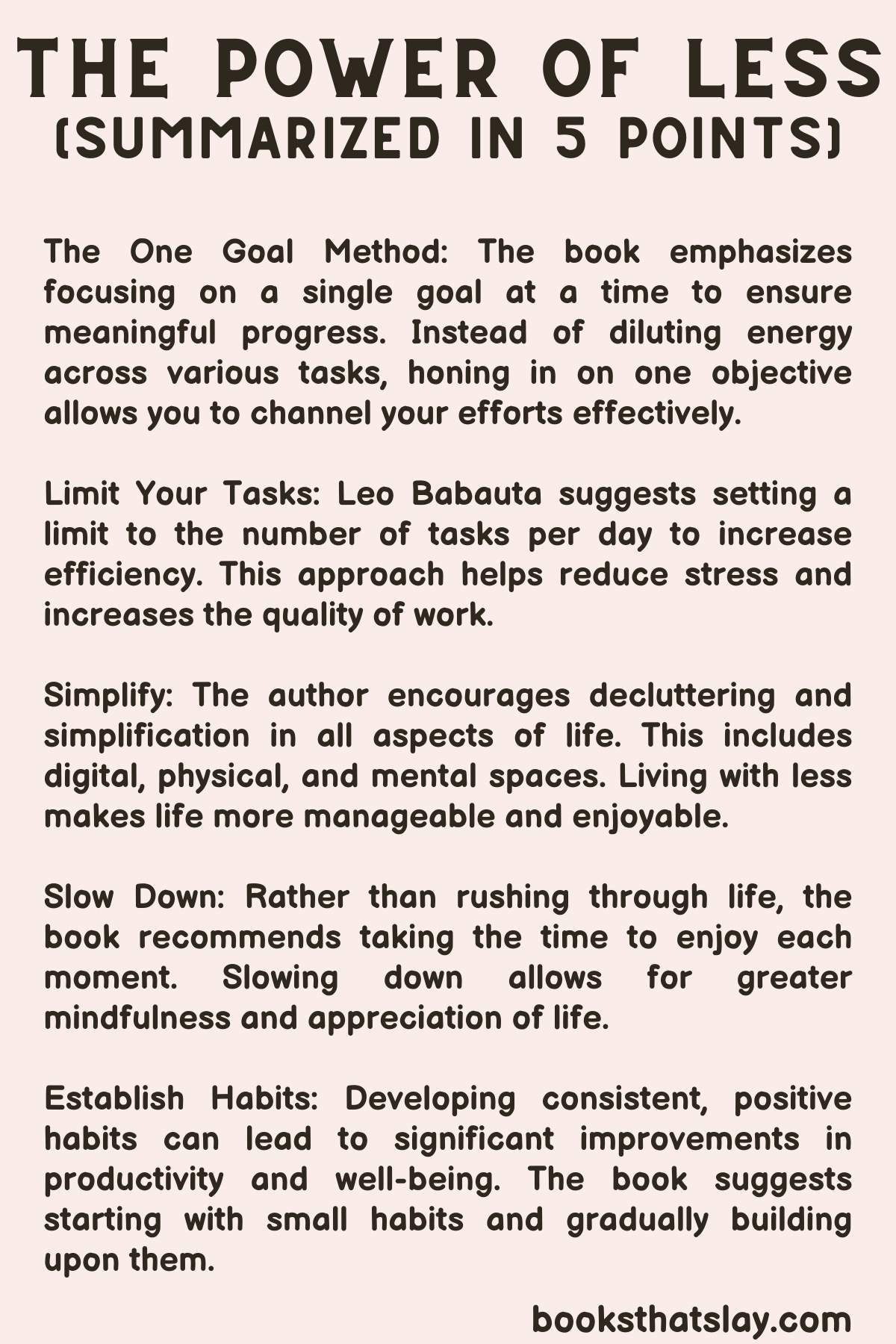The Power of Less | Book Summary
“The Power of Less: The Fine Art of Limiting Yourself to the Essential” is a self-help and productivity book written by Leo Babauta, the creator of the blog Zen Habits. The book focuses on the concept of doing less to achieve more by focusing on what is essential, eliminating what is not, and creating habits and routines that help improve productivity and personal life.
The Power of Less Summary
The book is divided into three parts: The Principles, The Techniques, and The Power of Less in Action.
- The Principles:
In this section, Babauta outlines the six principles of living with less and how they relate to achieving goals and increasing productivity. These principles are:
- Set Limitations: By limiting what you have to do or what you have in your life, you can focus more on these things and do them better.
- Choose the Essential: By focusing only on the essentials, you remove clutter and distractions, increasing productivity.
- Simplify: The simpler the task or goal, the easier it is to focus and accomplish it.
- Focus: Concentrating on one task at a time increases efficiency and the quality of work.
- Create Habits: Habits are powerful because they automate tasks and free up mental space for other things.
- Start Small: Smaller tasks are less intimidating, making it easier to start and eventually leading to larger accomplishments.
- The Techniques:
In this section, Babauta gives practical advice on how to implement these principles in your life. He provides techniques on how to set and achieve goals, how to create and maintain habits, and how to manage tasks and time effectively.
He emphasizes the importance of starting small and focusing on one goal at a time. He also discusses the concept of “batching” tasks (performing similar tasks in a grouped manner) and “single-tasking” (focusing on one task at a time rather than multitasking).
- The Power of Less in Action:
In the last section, Babauta provides real-life examples of how to apply the principles and techniques in various areas of life.
He covers topics such as email, Internet, health, and fitness. For each topic, he provides practical tips, such as limiting the number of times you check email each day, using the Internet more effectively, and developing healthy eating and exercise habits.

What can you learn from the book?
1. Setting Limitations Enhances Productivity
Babauta emphasizes the value of reducing the number of tasks and projects you undertake to better focus on those which are truly important.
He recommends adopting a minimalist approach, suggesting that instead of taking on multiple projects simultaneously, we should limit ourselves to only one project at a time.
This shift in approach allows us to give our undivided attention to one task, thereby ensuring high-quality results.
For instance, Babauta talks about reducing his commitments and focusing on his blog, Zen Habits, which subsequently became a top productivity blog within a year.
The lesson here is that setting limitations can counterintuitively boost productivity by eliminating clutter and directing focus.
2. The Power of Small, Incremental Changes
Babauta underscores the significance of breaking big tasks into smaller, manageable steps, often referred to as the “one percent rule”.
This lesson teaches us that small, incremental changes, when consistently maintained, can lead to significant improvement over time. By taking it slow and steady, we avoid the stress that often accompanies large-scale transformations.
Babauta’s own life serves as an example here – he changed his life one habit at a time, beginning with quitting smoking, then running, veganism, decluttering, and so on.
This transformation was achieved not in one fell swoop, but through gradual and consistent changes.
3. Mastering Essential Tasks and Eliminating Non-Essentials
Babauta argues that we often involve ourselves in tasks that are non-essential and thus detract from our focus on truly meaningful and impactful activities.
He suggests creating a list of the most important tasks (MITs) each day – ideally no more than three – and ensuring that these are accomplished before we deal with lesser priorities.
In this way, even if the day gets away from us, we’ve still completed the tasks with the greatest impact.
For instance, if you are a writer, your MIT could be writing 500 words for your book every morning before you even open your email.
4. Embracing Minimalism to Achieve Mental Clarity
According to Babauta, our environment reflects our mind, and a cluttered environment results in a cluttered mind. He advises us to begin decluttering one area at a time, perhaps starting with our email inbox or desktop, and then slowly expanding this practice to other areas.
This minimalism doesn’t just apply to physical possessions but also to our commitments, projects, and even the people we spend time with.
The concept of minimalist living teaches us that by letting go of the unnecessary, we can make room for the essential, ultimately leading to greater peace of mind and focus.
Final Thoughts
In conclusion, “The Power of Less” is a guide to improving productivity and focus by simplifying tasks, eliminating non-essentials, and cultivating productive habits. It provides actionable steps and practical advice to help readers live a more effective and fulfilling life by doing less.
Check out our other book summaries
The Book of Five Rings | Book Summary
A classic Japanese martial arts text written by Miyamoto Musashi, offering profound insights on strategy, tactics, and philosophy for achieving success in both combat and life.
A classic Chinese military treatise by Sun Tzu, offering strategic insights on warfare. Emphasizing preparation, deception, and adaptability, it advises using intelligence to overcome enemies, with a focus on achieving victory through minimal conflict.
No More Mr. Nice Guy | Book Summary
Dr. Glover combines case studies, practical advice, and exercises to help Nice Guys identify their patterns, understand their past, and take concrete steps towards a more assertive, confident, and healthier way of living.
How to Raise An Adult | Book Summary
Julie Lythcott-Haims critiques the overparenting trend in modern society, arguing it stifles independence and hampers the development of self-reliant adults.
Why Zebras Don’t Get Ulcers | Book Summary
Discover the intriguing insights behind stress and health in this Robert Sapalsky masterpiece. Read this comprehensive book summary and learn how stress impacts us.


